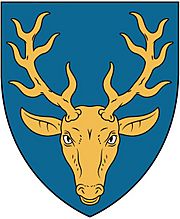Earl of Seaforth facts for kids
Quick facts for kids Earldom of Seaforth |
|
|---|---|
 |
|
| Creation date | 3 December 1623 |
| Creation | First |
| Monarch | James I |
| Peerage | Peerage of Scotland |
| First holder | Colin Mackenzie, 1st Earl of Seaforth |
| Last holder | Kenneth Mackenzie, 1st Earl of Seaforth |
| Status | Extinct |
| Extinction date | 1781 |
| Seat(s) | Brahan Castle |
| Motto | Luceo Non Uro ("I shine but do not burn") |
The Earl of Seaforth was a special title given to leaders of the Mackenzie family in Scotland. This title was part of the Peerage of Scotland and later the Peerage of Ireland. It got its name from Loch Seaforth, a sea loch on the Isle of Lewis.
The Mackenzie family held this title from 1623 to 1716. It was then brought back for a short time from 1771 to 1781.
History of the Seaforth Earls
The Mackenzie family began with Colin of Kintail around the year 1278. Their name is a different way of saying "son of Kenneth."
The First Earls
The twelfth leader of the Mackenzie family, Kenneth, became Lord Mackenzie of Kintail in 1609. His son, Colin, then became the first Earl of Seaforth in 1623.
Colin's half-brother, George, became the 2nd Earl in 1633. George changed sides a few times during a difficult period in Scottish history. Sometimes he supported the King (a Royalist), and other times he sided with a group called the Covenanters, who wanted to protect the Scottish church. Later, he joined King Charles II in Holland. Charles II made him a very important government official for Scotland.
George's grandson, Kenneth, was the 4th Earl. He supported King James VII (who was also James II of England) when James was removed from the throne. Kenneth even went with James to France and Ireland. In 1690, James gave Kenneth new titles, like Marquess of Seaforth. Kenneth was sent to lead a rebellion in Scotland in 1689, but he was captured and put in prison. He was released in 1697 and died in Paris in 1701.
The Jacobite Rebellions
Kenneth's son, William, became the 5th Earl. He was a strong supporter of the Jacobite cause. The Jacobites wanted to bring James II's family back to the throne.
In 1715, William joined the Jacobite rebellion at Braemar. He gathered 3,000 men and fought in the Battle of Sheriffmuir. He was made a lieutenant-general, a high military rank. William also took part in another Jacobite attempt in 1719, where he was wounded at the Battle of Glenshiel.
Because of his actions, in 1716, William was declared a traitor. This meant his titles and lands were taken away from him. This process is called being "attainted." He died in 1740. Even though some of his punishments were later eased, his titles were never given back.
His son, Kenneth, would have been the 6th Earl if the titles hadn't been taken away. This Kenneth actually helped the British government during the rebellion of 1745. He also served as a member of parliament for several years.
A New Earldom of Seaforth
Kenneth's son, also named Kenneth Mackenzie, was given new titles. In 1766, he became Baron of Ardelve and Viscount Fortrose in the Peerage of Ireland. Then, in 1771, he was made Earl of Seaforth again, also in the Peerage of Ireland.
However, these new titles ended when he died in 1781 because he had no children to pass them on to. Even though there were other family members who could have inherited the older earldom, it remained officially taken away. This Kenneth also created a special army regiment called the 78th Highlanders, later known as the Seaforth Highlanders.
Later Seaforth Titles
The Seaforth title was brought back two more times after the earldom ended in 1781.
In 1797, a soldier and politician named Francis Mackenzie was made Lord Seaforth. He was a grandson of a younger son of the 4th Earl. Sadly, all four of Lord Seaforth's sons died before him. So, when he passed away in 1815, this title also ended.
His daughter, Mary Elizabeth Frederica Mackenzie, married James Alexander Stewart-Mackenzie. Their grandson, James Stewart-Mackenzie, was a soldier and helped many people. In 1921, the title of Baron Seaforth was brought back for him. He had no children, so when he died in 1923, this title also ended.
List of Titleholders
Here are some of the people who held the Seaforth titles:
Lords Mackenzie of Kintail (1609)
- Kenneth Mackenzie, 1st Lord Mackenzie of Kintail (died 1610 or 1611)
- Colin Mackenzie, 2nd Lord Mackenzie of Kintail (died 1633) (He was later made Earl of Seaforth in 1623)
Earls of Seaforth (1623 creation)
- Colin Mackenzie, 1st Earl of Seaforth (died 1633)
- George Mackenzie, 2nd Earl of Seaforth (died 1651)
- Kenneth Mackenzie, 3rd Earl of Seaforth (1635–1678)
- Kenneth Mackenzie, 4th Earl of Seaforth (1661–1701)
- William Mackenzie, 5th Earl of Seaforth (died 1740) (His titles were taken away in 1716)
Earls of Seaforth (1771 creation)
- Kenneth Mackenzie, 1st Earl of Seaforth (around 1744–1781) (This title ended when he died)
Barons Seaforth (1797 creation)
- Francis Humberston Mackenzie, 1st Baron Seaforth (1754–1815)
Barons Seaforth (1921 creation)
See also
 | John T. Biggers |
 | Thomas Blackshear |
 | Mark Bradford |
 | Beverly Buchanan |


